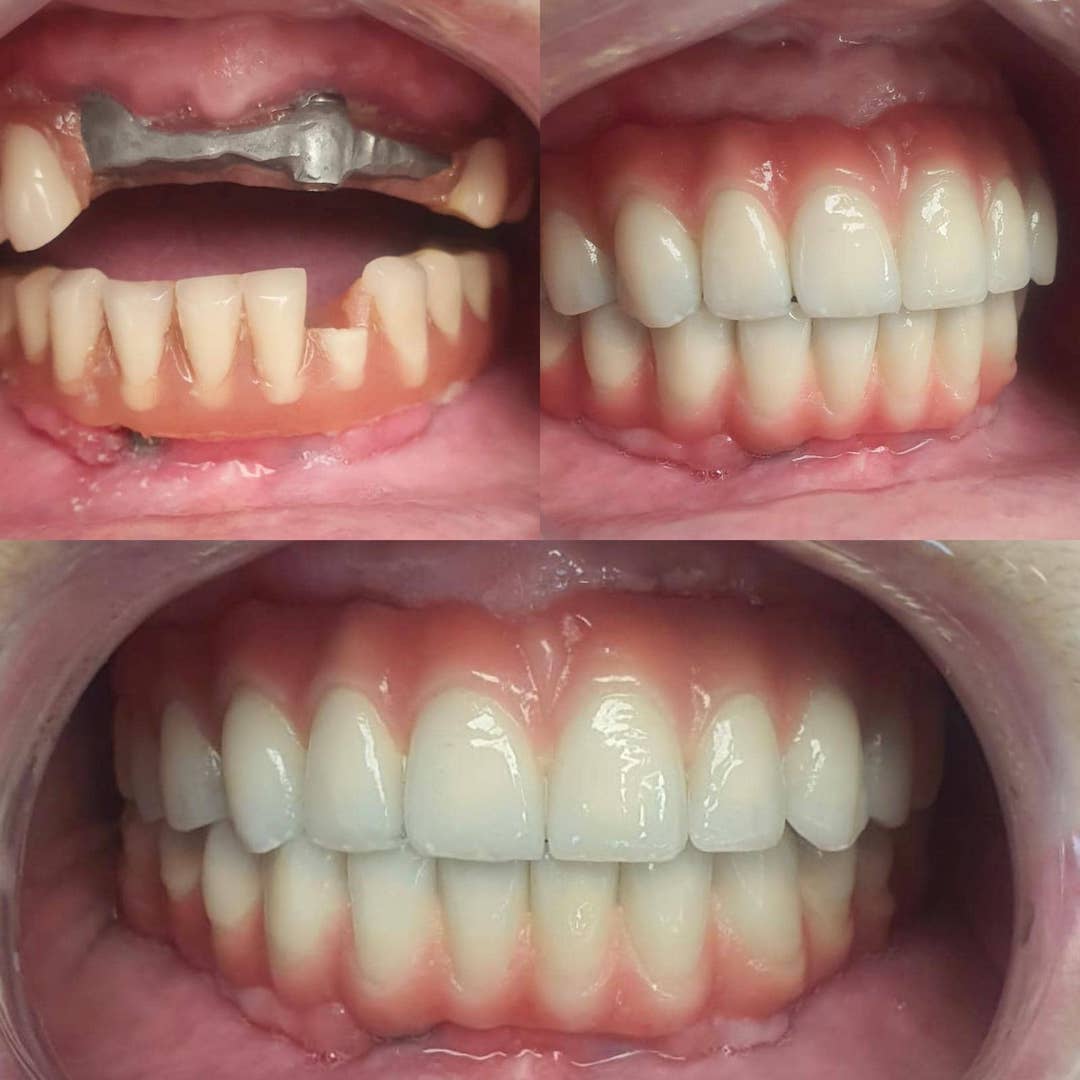Implant prostheses in Tenerife
Specialists in implant prostheses in Tenerife

About SJD Dentists
WHAT ARE IMPLANT-SUPPORTED PROSTHESES?
Implanted dentures are dental structures that are placed over bone-integrated dental implants, usually used to replace all natural teeth in one or both arches of a patient. There are several types of implant dentures, including fixed dentures, overdentures and hybrid dentures.
Fixed dentures are full-arch dentures secured to six or eight dental implants. They are fully customisable and are made of materials such as metal-ceramic or zirconia, which allows for a more natural look and wear resistance.
Overdentures are removable prostheses that are placed over dental implants, requiring fewer implants than fixed prostheses. They are fixed using indirect techniques, allowing the patient to remove and insert the prosthesis, facilitating hygiene.
Finally, hybrid prostheses are supported by both dental implants and the mucosal surface of the gum. They are recommended for patients with considerable bone resorption and are made of acrylic materials, offering a more artificial appearance. Cleaning them requires the dentist to unscrew the prosthesis, which involves regular check-ups to keep the prosthesis in good condition. Whatever your case may be, if you are interested in our implant prostheses in Tenerife, do not hesitate to call us.
HOW DOES IMPLANT-SUPPORTED PROSTHETICS WORK?
A prosthesis on implants is a dental device used to replace missing teeth and functions in a manner similar to natural teeth. Here’s a detailed explanation of the process:
Firstly, the dentist places a dental implant, which is a small screw-like component typically made of titanium, into the patient’s bone. This implant serves as an artificial root for the new tooth.
After placement, time is allowed for the implant to fully integrate with the bone in a process known as osseointegration. During this period, the bone grows around the implant, securing it firmly in place.
Once the implant has successfully fused with the bone (a process that can take several months), an abutment is placed on top of it. This abutment serves as the foundation for the dental prosthesis.
Finally, the prosthesis—whether a crown, a bridge, or a full denture—is fitted and secured onto the abutment. This prosthesis is custom-made for the patient to ensure it fits their mouth perfectly and matches the colour and shape of their natural teeth.
An implant-supported prosthesis functions like a natural tooth, enabling the patient to chew and speak normally. Additionally, it helps preserve the health of the jawbone, as the implant stimulates the bone in the same way a natural tooth root would. This is crucial for maintaining the patient’s facial structure and preventing bone loss, which can occur when teeth are missing.
Customer Reviews for SJD Dentists

Todo el personal con una estupenda actitud de trato. Yo me suelo poner muy nervioso en estos casos, pero de verdad que que me han transmitido calma y serenidad.
Clínica en muy buenas condiciones.
Gracias
Por otro lado el funcionamiento de la clínica es inmejorable, rara vez he tenido que esperar más de 10 minutos, siempre te pueden adaptar la cita a tus horarios. Muchas gracias por todo
Gracias 🤩
Han salido contentísimos, muchísimas gracias.
Todo lo que diga es poco para el trato que recibo
Hoy fue un día especial para mí y mis miedos,ellos hacen que me sienta bien y me trasmiten muchísima tranquilidad,son unos profesionales que te hacen sentir como en casa,pero además devolviendote la sonrisa
Prueba superada🥰👌
GRACIAS 🫂
Saludos
Juan Manuel Mesa.

Gracias por todo y por esta ayuda tan grande que hace recuperar la sonrisa.
Absolutamente recomendable.
Frequently Asked Questions
Frequently Asked Questions About Implant-Supported Prostheses
In this section, we will address the most important frequently asked questions that most clients have about implant-supported prostheses.
What types of prostheses can be made on implants?
There are several types of prostheses that can be fabricated and placed on dental implants, including:
Fixed prostheses on implants: These are fixed directly onto dental implants and replace all the teeth in one or both arches. They are typically made of metal-ceramic or zirconia, which are durable and aesthetic materials.
Overdentures: These are removable prostheses that anchor onto dental implants, offering greater stability compared to conventional dentures.
Hybrid prostheses on implants: These combine the characteristics of both fixed and removable prostheses. They are supported by implants and the surface of the gum tissue. They are usually recommended for patients with significant bone loss.
The choice of implant-supported prosthesis will depend on various factors, including the patient’s oral health, the quantity and quality of the available bone, the patient’s preferences, and the recommendation of the dentist or prosthetics specialist.
What is better: an implant or a prosthesis?
The choice between a dental implant and a prosthesis largely depends on the individual needs and specific circumstances of the patient, as each option has its own benefits and considerations.
Dental implants are long-term replacements for lost teeth that are inserted into the bone. They closely resemble and feel like natural teeth, and can last for many years, even a lifetime, with proper care. Implants do not require the modification of adjacent teeth, as happens with dental bridges, and they help prevent bone loss that can occur with tooth loss.
Prostheses, on the other hand, are removable devices that can replace one or more missing teeth. Full prostheses (or dentures) are used when all teeth are missing, while partial prostheses are used when some natural teeth remain. Prostheses are generally less expensive than implants and can be a suitable option for people with insufficient or fragile jawbone.
Ultimately, the best option will depend on factors such as the patient's overall oral health, the number of missing teeth, the health and density of the bone, the patient's personal preferences, and the dentist's recommendations.
How many years does a full prosthesis last?
The durability of a full prosthesis, also known as dentures, can vary depending on several factors such as care, materials used, and the patient's adaptation. Generally, a well-maintained full prosthesis can last between 5 to 10 years.
However, even though the prosthesis itself can last for a decade, it is important to remember that the mouth and gums can change over time. These changes may cause the prosthesis to no longer fit properly, leading to discomfort and chewing problems. For this reason, dentists recommend regular visits to the dental office to ensure the prosthesis remains well-fitted and to make adjustments or replacements when necessary.
Additionally, proper daily maintenance and care of the prosthesis are essential to extend its lifespan. This includes cleaning it properly every day, not wearing it while sleeping, and storing it in a safe place when not in use.
Is the procedure for placing an implant-supported prosthesis painful?
The procedure for placing implant-supported prostheses in Tenerife is generally performed under local anaesthesia, meaning that the specific area being worked on is numbed so that no pain is felt during the procedure. As a result, most patients do not experience pain during the implant placement.
After the procedure, it is normal to experience some discomfort or swelling in the implant area for a few days. These symptoms are usually mild and can be managed with over-the-counter painkillers and the use of cold compresses to reduce swelling.
It is important to note that each person may have a slightly different experience depending on their pain threshold, overall health, and the complexity of their specific case. However, in general, the implant placement procedure is well tolerated by most patients.
If you experience severe or persistent pain after the placement of an implant-supported prosthesis, it is important to contact your dentist as soon as possible, as this may indicate a problem that needs to be addressed.
What are the advantages and disadvantages of implant-supported prostheses compared to traditional dentures?
Implant-supported prostheses and traditional dentures are viable options for replacing missing teeth, and each has its own advantages and disadvantages.
Advantages of Implant-Supported Prostheses:
-
Stability: Implant-supported prostheses are anchored to implants that have integrated into the jawbone, providing superior stability and fit compared to traditional dentures. This eliminates the risk of the prosthesis slipping or falling out, allowing for more confident speaking and eating.
-
Comfort: Since they are firmly anchored, implant-supported prostheses are typically more comfortable than dentures, which can cause rubbing or sores in the mouth.
-
Bone preservation: Implants help preserve the jawbone, preventing bone loss that can occur when teeth are missing.
-
Aesthetics: Implant-supported prostheses generally have a more natural appearance than traditional dentures.
Disadvantages of Implant-Supported Prostheses:
-
Cost: Dental implants are usually more expensive than traditional dentures.
-
Surgical procedure: The placement of implants requires a surgical procedure, which may not be suitable for everyone, particularly those with health conditions that prevent surgery or insufficient bone health.
-
Time: The implant and prosthesis placement process can take several months, as the bone needs time to integrate with the implant.
On the other hand, traditional dentures are less expensive, do not require surgery, and can be a good option for those who are not candidates for implants. However, they may be less stable, less comfortable, and do not preserve the jawbone in the same way that implants do.
Get benefits at SJD Dentistas
We guarantee the best service
Payment Methods
We offer payment facilities
We provide different payment options so you can undergo the dental treatments you need whenever you require them.
Trust Us
Personalised services
Hundreds of satisfied clients support a team of highly qualified dentists who guarantee you the best results.
Special Promotion
Come with a companion on your first visit
Ask about our loyalty rate. Both you and your companion can benefit from this promotion.
Do you have any questions?
Contact us
Send us your inquiry
You can contact us at any office hours, or call us during extended hours at the direct phone numbers.
- Calle San Juan, 5238202 La Laguna
- Avenida Modesto Hernández González, 338629 Las Chafiras, San Miguel de Abona
Leave us your message













